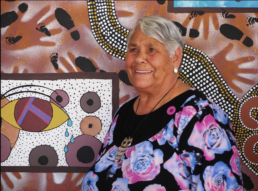These life stories may contain descriptions of childhood trauma and abuse, as well as images, voices and names of people now deceased. If you need help, you can find contact details for some relevant support services on our support page.
Aboriginal Australian activist and former public administrator, Lowitja (Lois) O’Donoghue (1932-2024), was in an institution as a child.
Lowitja was born to an Irish pastoralist and a Yunkunytjatjara woman in Indulkana, an Aboriginal community on the Anangu Pitjantjatjara Yankunytjatjra (APY) Lands, about 1110 km northwest of Adelaide, South Australia. The second youngest of six children, Lowitja never knew her father. At the age of two, she and two of her sisters were removed from their mother; Lowitja did not see her mother again for thirty years.
Lowitja was renamed Lois by the missionaries at the Colebrook Children’s Home in Quorn, a small town in the Flinders Rangers, 337 km north of Adelaide. The Colebrook Home was established in 1927 by the United Aborigines Mission. It operated in Quorn until 1944 when it was moved to suburban Eden Hills in Adelaide.
Lowitja attended Unley Girls Technical High School in Adelaide (which was taken over by the Mitcham Girls Technical High School in 1964 and became Mitcham Girls High School in 1975). Like many members of the Stolen Generations, Lowitja was trained to be a domestic servant. At the age of sixteen, she went to work for a family in Victor Harbour, a coastal town 84 km south of Adelaide.
In the early 1950s, O’Donoghue campaigned with the Aborigines’ Advancement League to fight for the right of Aboriginal women to enter the nursing profession.
In 1954, O’Donoghue became the first Aboriginal person to train as a nurse at the Royal Adelaide Hospital. During her ten-year career at the hospital, she was promoted to charge nurse. She then worked as a nurse with the Baptist Overseas Mission in Northern India, which increased her understanding of the global impact of colonisation.
O’Donoghue returned to South Australia in 1962 and began a career in public service. She worked for the South Australian government as an Aboriginal welfare office and joined the new Federal Department of Aboriginal Affairs in 1967. She was promoted to Regional Director of the Adelaide office of the Department of Aboriginal Affairs in 1970, as the first woman regional director of any Australian federal department.
O’Donoghue was involved with the Aboriginal Legal Rights Movement between 1970-1972. In 1979, O’Donoghue married Gordon Smart, a medical orderly. The couple had no children.
I resolved very early in life that I wouldn’t marry or have children because I saw my life as being totally dedicated to working for the betterment of my people. Of course, I weakened when I was 47 and Gordon Smart came along… He was a few years older than me and he accepted that my demanding career had to continue (State Library of South Australia).
O’Donoghue continued her work for Aboriginal people in a variety of capacities. Between 1990 and 1996, she was the inaugural Chair Aboriginal and Torres Strait Islander Commission (ATSIC). In this role, she was instrumental in drafting Native Title legislation. In 1993, she led the Australian delegation working on the proposed United Nations Declaration of Rights for Indigenous People and was the first and only Aboriginal person to address the UN General Assembly.
In 1996, O’Donoghue became the inaugural Chair of the Cooperative Research Centre for Aboriginal and Tropical Health. She was a key advisor for the 2000 Sydney Olympic Games, and counselled former Prime Minister Kevin Rudd in preparation for the 2008 Apology to the Stolen Generations.
In 2010, the Lowitja Institute for health research was founded in O’Donoghue’s honour. In 2022, the Institute announced the formation of the Lowitja O’Donoghue Foundation, the only national health research institute that is Aboriginal and Torres Strait Islander community-controlled.
O’Donoghue’s incredible list of honors and achievements includes honorary doctorates from five universities. She is an honorary fellow of the Royal College of Nursing in Australia, was Australian of the Year in 1984, and won an ‘SA Great’ award in 1992. In 1976, she was the first Aboriginal woman to be made a Member of the Order of Australia (OA).
Other honours include an Order of Australia in 1976, Advance Australia Award in 1982, Commander of the Order of the British Empire in 1983, Australian of the Year in 1984, National Living Treasure in 1998, a Companion of the Order of Australian in 1999, and a NAIDOC Lifetime Achievement Award in 2009.
When asked about influences by Stewart Cockburn for his 1997 book, Notable lives: profiles of 21 South Australians, O’Donoghue responded:
Martin Luther King, Nelson Mandela and Archbishop Tutu. They have always been a source of inspiration to me. So was Don Dunstan when he was Premier and, of course, Paul Keating. The Fraser Government passed the Land Rights Act and Malcolm Fraser has always been supportive. Malcolm’s door was always open.
O’Donoghue died peacefully surrounded by immediate family on 4 February 2024 on Kaurna Country in Adelaide. The family issued a statement in her memory.
Aunty Lowitja dedicated her entire lifetime of work to the rights, health, and wellbeing of Aboriginal and Torres Strait Islander peoples. We thank and honour her for all that she has done – for all the pathways she created, for all the doors she opened, for all the issues she tackled head-on, for all the tables she sat at and for all the arguments she fought and won.
We thank her for being a formidable leader who was never afraid to listen, speak and act.
References
“Colebrook Home (1927 – 1981).” Find & Connect, 2021. https://www.findandconnect.gov.au/guide/sa/SE00138
“Family Statement”. Lowitja O’Donoghue Foundation. https://www.lowitja.org.au/lowitja-foundation/family-statement/
“Lowitja O’Donoghue. Australian Activist”. Britannica. https://www.britannica.com/biography/Lowitja-ODonoghue
“Lowitja O’Donoghue” NAIDOC. https://www.naidoc.org.au/awards/winner-profiles/lowitja-odonoghue
“The Aboriginal Voice. Lowitja O’Donoghue – Elder of our nation”. State Library of South Australia. https://women-and-politics.collections.slsa.sa.gov.au/abor1.htm
Cockburn, Stewart. (1997). Notable lives : profiles of 21 South Australians. Ferguson Publications.
Image available here.
